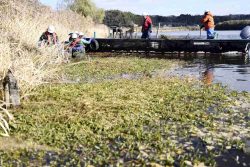16:56 JST, October 20, 2022
LONDON (Reuters) — Nestle will spend more than 1 billion Swiss francs ($1 billion) by 2030 on efforts to source coffee sustainably, the food company said on Oct. 4, more than double its previous pledge.
The move provides more evidence of how major consumer goods businesses are making changes to decades-old operational systems due to climate change concerns.
At the Reuters IMPACT conference on Oct. 3, IKEA CEO Jesper Brodin said home deliveries would be made by electric vehicles by 2025 as part of a target at the world’s No.1 furniture brand to reduce greenhouse gas emissions over the next eight years.
The boss of Rolls Royce also said during the IMPACT conference that the aviation industry needs to accelerate the use of biofuels. Ivan Menezes, CEO of Diageo, the world’s biggest exporter of Scotch whisky through brands like Johnnie Walker, said Scotland could face a water shortage unless businesses and lawmakers act.
Study after study has shown that by 2050 roughly half the land currently used to grow coffee, especially the high quality arabica variety, could be unproductive thanks to rising temperatures, drought and disease.
Multinationals are meanwhile facing increased reputational and legal pressure from consumers and governments alike to clean up their global supply chains in the fight against climate change.
The European Commission has proposed several laws aimed at preventing and, in the case of forced labor, banning the import and use of products linked to environmental and human rights abuses.
Nestle, which has already pledged to source all its coffee sustainably by 2025, said it is aiming, by that date, for 20% of its coffee to be grown using “regenerative” agricultural practices.
These include planting cover crops to protect soil, using organic fertilizers to improve soil fertility and increasing the use of agroforestry and intercropping to preserve biodiversity — all with the aim of halving greenhouse gas emissions by 2030.
The company’s statement announcing its plan to double spending on sustainable coffee sourcing said it is “committed to supporting farmers who take on the risks and costs associated with the move to regenerative agriculture,” and will provide programs aimed at helping them improve their income.
A major coffee report published last year said there is little evidence efforts by the world’s top coffee roasters and traders to prevent human rights and environmental abuses are having any impact, with most farmers operating at a loss and unable to produce sustainably.
The coffee sector is valued at $200 billion to $250 billion a year at the retail level, based on the report, but producing countries receive less than 10% of that value when exporting beans, and farmers even less than that.
Around 125 million people around the world depend on coffee for their livelihoods, while an estimated 80% of coffee-farming families live at or below the poverty line, according to nonprofit organizations Fairtrade and Technoserve.
Top Articles in Science & Nature
-

Japan Institute to Use Domestic Commercial Optical Lattice Clock to Set Japan Standard Time
-

Japan to Face Shortfall of 3.39 Million Workers in AI, Robotics in 2040; Clerical Workers Seen to Be in Surplus
-

Record 700 Startups to Gather at SusHi Tech Tokyo in April; Event Will Center on Themes Like Artificial Intelligence and Robotics
-

iPS Treatments Pass Key Milestone, but Broader Applications Far from Guaranteed
-

iPS Cell Products for Parkinson’s, Heart Disease OK’d for Commercialization by Japan Health Ministry Panel
JN ACCESS RANKING
-

Japan PM Takaichi’s Cabinet Resigns en Masse
-

Japan Institute to Use Domestic Commercial Optical Lattice Clock to Set Japan Standard Time
-

Israeli Ambassador to Japan Speaks about Japan’s Role in the Reconstruction of Gaza
-

Man Infected with Measles Reportedly Dined at Restaurant in Tokyo Station
-

Videos Plagiarized, Reposted with False Subtitles Claiming ‘Ryukyu Belongs to China’; Anti-China False Information Also Posted in Japan























